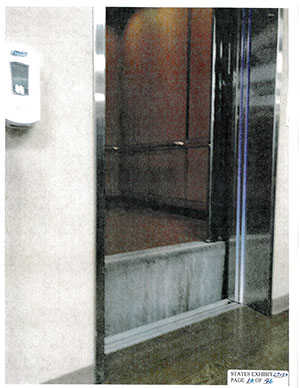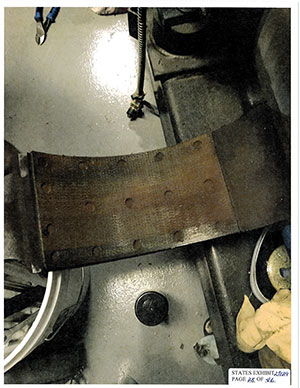Brake failure is being blamed for an accident that severely injured a nurse at John Peter Smith Hospital in Fort Worth earlier this year, according to a report released Wednesday by the Texas Department of Licensing and Regulation, the agency responsible for regulating elevators in Texas.
Nurse Carren Stratford, 56, entered Elevator 29 on Jan. 20 and was soon after crushed when her right foot became caught as the elevator continued to move. Stratford suffered brain damage and internal injuries in the accident and spent nearly a month in a coma before waking up. She was then transferred out of the ICU and into a step-down unit where she continues to recover from her injuries.
 Texas Department of Licensing and Regulation
Texas Department of Licensing and RegulationIn a report released Wednesday, the TDLR said, "worn-out brake shoes did not set firmly when the elevator arrived at the tenth floor, so the elevator car continued to move when the doors opened and the nurse attempted to enter."
Further, the "worn brake shoes and frozen pins illustrated a lack of routine maintenance and equipment checks" and that there was "no visible signs of lubrication on the brake sleeve and core after the accident."
As a result of its investigation, the TDLR issued a formal statewide alert to "all building owners and elevator contractors regarding the need for routine elevator maintenance, particularly for elevators with drum brakes." The warning continued to say, "in the interest of public safety, TDLR urges all building owners and contractors to discuss this safety alert to ensure that proper maintenance of drum brakes is occurring as required."
The state made clear that the alert was meant for both building owners and to elevator maintenance companies, saying: "While licensed elevator contractors must have the necessary technical expertise to maintain and repair elevators, escalators and related equipment, the building owner is responsible for compliance with all applicable laws, rules, codes and maintenance standards."
Local
The latest news from around North Texas.
Thyssenkrupp, the company contracted to maintain the elevators for JPS Health, told NBC 5 Investigates Wednesday afternoon that they had not yet had a chance to review the report and that they would be in touch.
TDLR, meanwhile, said the elevator will not be allowed back into service until the entire braking assembly is rebuilt, reassembled, adjusted and tested and that a TDLR chief elevator inspector will be present for those tests.

Following the release of the state's report, JPS Health said Wednesday, "we received the accident investigation report from the Texas Department of Licensing & Regulation [TDLR] that clearly concludes a lack of routine maintenance and equipment checks by the company contracted to provide those services caused the elevator brakes to fail," said JPS President and CEO Robert Earley.
JPS Health added that the state's report cited numerous deficiencies in routine maintenance that resulted in the brake failure.
In previous reports from NBC 5, Earley complained about the service provided to the hospital by thyssenkrupp and in March JPS Health announced they'd fired the company and entered into a five-year agreement with SW Elevators Inc., who will staff two full-time mechanics to maintain the hospital's elevators beginning May 14.
 Texas Department of Licensing and Regulation
Texas Department of Licensing and RegulationOn Jan. 11, a week before Stratford's injury, thyssenkrupp sent a letter to the hospital warning against unqualified hospital employees working on the elevators saying they could put the public at risk. Earley responded saying hospital employees never repaired the elevators "and we never jeopardize the health or safety of our patients, team members or visitors by forcing them to remain in elevators which are incapacitated by TKE’s failure to live up to its obligations."
"Routine maintenance is critical to the safe and reliable operation of elevators," said Brian E. Francis, executive director of the Texas Department of Licensing and Regulation. "TDLR takes the safety of our fellow Texans seriously, and we cannot overemphasize the importance of adhering to the manufacturers' recommended schedules and actions."
The second phase of the state's investigation continues to determine what, if any, enforcement action should be taken related to the accident.
NBC 5's Scott Friedman, Scott Gordon and Don Peritz contributed to this report.



